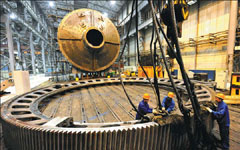Think services, inclusion and green
By Christine Lagarde (China Daily) Updated: 2014-03-26 09:07Innovation and enterprise also require a modern, resilient financial sector that can bring together savers and entrepreneurs to produce new jobs and incomes. China has vast savings and is already home to some of the largest banks in the world. Further measures to open up the financial system will turn them into global players.
And the future supervisors and regulators of this integrated financial system will need to ensure that these players abide by rules that safeguard financial stability, both domestic and global. That is a big lesson we all learned from the financial crisis.
Second, think inclusion. In many parts of the world, economic growth has come at the expense of rising inequality.
 |
|
 |
Recent IMF studies have shown that unequal societies grow less, and when they do grow, growth is less sustainable. Inequality also erodes the social fabric. Improving access to education, healthcare, and financial services can be powerful forces in overcoming inequality. The right kind of redistributive policies, such as progressive taxation and a strong safety net, can also help.
As Lao Tzu wisely said: "The most empowering way is to inspire people so that they become able to realize their own potential."
What about gender inequality? At 46 percent of its labor force, China's women are advancing at rates nearly as strong as its overall expansion. In Chinese companies, nearly 20 percent of CEOs are women, compared to only 4 percent of women in the Standard and Poor's 500 companies. So women in China are certainly making their mark. Yet it is important to remember that some women are still left behind. Many women in rural China, for example, are eking out a living while shouldering heavy domestic responsibilities. If China is to realize its nearly boundless potential, it must remove these obstacles. Third, think green. China's tremendous strides in economic development have come with a heavy price tag - poor air quality, water shortages, and rising desertification. By 2030, China's cities will have added 350 million more people, more than the entire population of the United States today. Five million buildings will be built; 50,000 of these will be skyscrapers, the equivalent of ten New York cities.
How is all this to be managed? The good news is that China has taken important steps to improve its environmental footprint, from spearheading innovation and implementation of renewable energy, to legislation to curb polluting industries. But as those who study, live, and breathe here in Beijing know only too well, there is still a long way to go.
"Each generation will reap what the former generation has sown," as a Chinese proverb says.
China has already established its leadership position in the global economy. As the country continues to grow, its global leadership will become even more important.
The author is managing director of International Monetary Fund. This is taken from her speech at Tsinghua University in Beijing on March 23.
- NHTSA says finds no 'defect trend' in Tesla Model S sedans
- WTO rare earth ruling is unfair
- Amway says 2014 China sales may grow 8%
- President Xi in Europe: Forging deals, boosting business
- CNOOC releases 2013 sustainability report
- Local production by Chery Jaguar Land Rover this year
- Car lovers test their need for speed in BMW Mission 3
- China stocks close mixed Monday

















